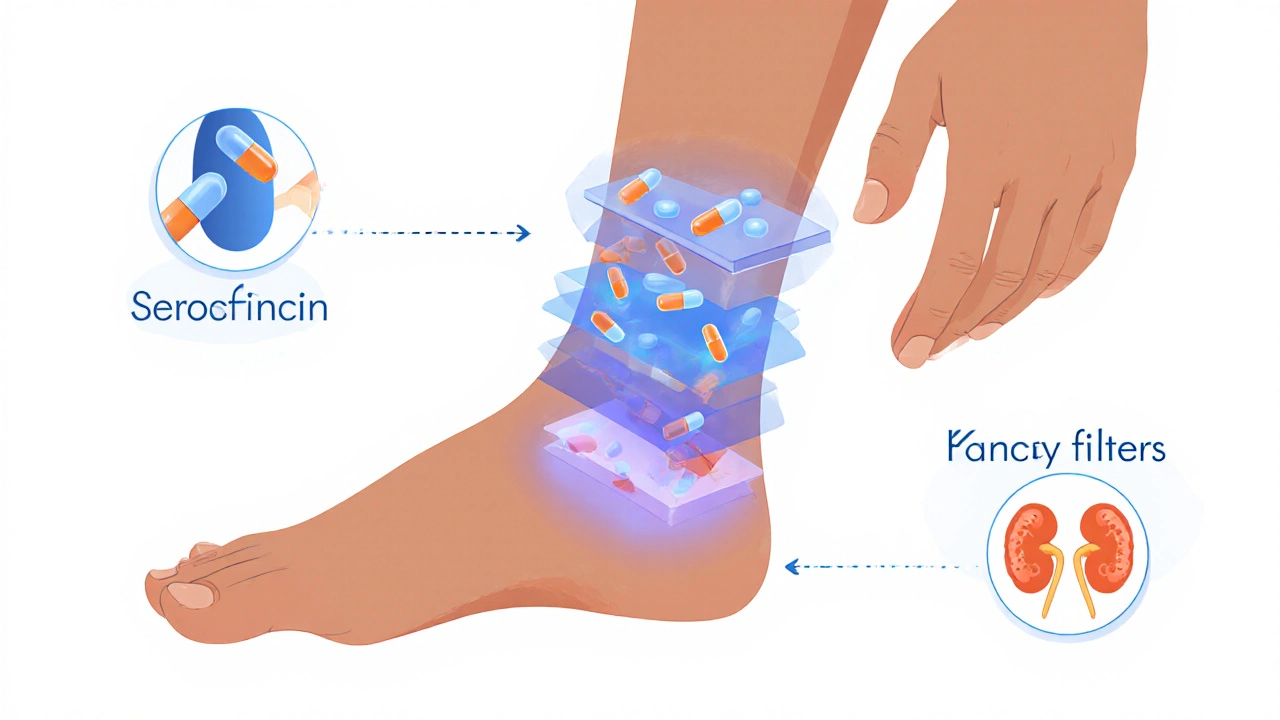Mental Health & Fluid Retention Symptom Checker
Your Results
Ever notice that tight shoes or a puffy face seem to show up when you’re stressed or down? That isn’t a coincidence. mental health and fluid retention are linked through hormones, medications, and everyday habits. This article untangles those connections, shows you what to watch for, and gives practical steps to keep both your mind and your body feeling light.
Key Takeaways
- Stress hormones, especially cortisol, can cause the body to hold onto extra water.
- Common mental‑health medicines such as antidepressants often list swelling as a side effect.
- Dietary sodium, inactivity, and poor sleep amplify fluid buildup when mental health is strained.
- Simple lifestyle tweaks-stress‑reduction techniques, balanced electrolytes, regular movement-can dramatically ease swelling.
What Is Fluid Retention?
Fluid retention is the accumulation of excess water in the body’s tissues, often noticeable as swelling in the feet, ankles, hands, or face. The medical term is edema. It occurs when the balance of fluid moving in and out of blood vessels is disrupted, usually because of changes in blood pressure, hormone levels, or kidney function.
How Mental Health Influences Body Fluids
When you’re anxious or depressed, your body’s stress response kicks in. Stress triggers the release of cortisol, a hormone that tells kidneys to retain sodium. More sodium means more water stays in your bloodstream, leading to that “puffy” feeling.
Researchers at the University of Pennsylvania (2023) found that people with chronic high‑cortisol levels were 35% more likely to report leg swelling compared with low‑cortisol counterparts. The chain looks like this:
- Psychological stress → ↑ cortisol
- Cortisol → ↑ sodium reabsorption in kidneys
- ↑ sodium → water retention → edema
Besides cortisol, the sympathetic nervous system releases norepinephrine, which can tighten blood vessels and raise blood pressure, another driver of fluid leakage into surrounding tissues.
Medications & Side Effects
Many mental‑health drugs list fluid retention as a known side effect. Antidepressants such as selective serotonin reuptake inhibitors (SSRIs) may cause mild swelling by affecting serotonin pathways that influence kidney function. Antipsychotics, especially the atypical class (e.g., olanzapine, clozapine), are more notorious for causing weight gain and peripheral edema due to their impact on metabolic hormones like leptin.
One 2022 meta‑analysis of 18 randomized trials reported a 12% incidence of ankle swelling among patients on high‑dose SSRIs versus 4% on placebo. If you notice unexplained puffiness after starting a new medication, discuss dose adjustments or alternatives with your prescriber.

Everyday Lifestyle Factors That Bridge Mind and Water Balance
Even without medication, everyday habits can tip the scale when mental health is unstable:
- Sodium intake: Processed foods, fast‑food meals, and salty snacks are easy to overconsume, especially when stress leads to “comfort eating.”
- Exercise: Physical activity pumps blood back toward the heart and activates the lymphatic system, which clears excess fluid. Sedentary days-common during depressive episodes-let fluid pool in the lower limbs.
- Sleep: Poor sleep raises cortisol and disrupts the body’s natural diuretic rhythm, making nighttime swelling more likely.
- Hydration: Counterintuitively, drinking enough water helps the kidneys flush out sodium. Dehydration signals the body to hold on to whatever water is available.
Spotting the Overlap: Symptoms by Mental‑Health Condition
| Condition | Common Mood Symptoms | Fluid‑Retention Clues |
|---|---|---|
| Depression | Low energy, loss of appetite, hopelessness | Puffy face in the morning, tight shoes, weight gain despite unchanged diet |
| Anxiety | Racing thoughts, muscle tension, insomnia | Swollen hands during panic attacks, swollen abdomen after chronic worry |
| Bipolar Disorder (depressive phase) | Fatigue, slowed thinking, tearfulness | Leg edema after periods of low activity, noticeable ankle swelling |
Notice how each mood pattern aligns with a specific swelling spot. This isn’t diagnostic, but it gives a clue that your mental state might be influencing fluid balance.
Practical Strategies to Ease Both Mind and Swelling
- Mindful Sodium Management: Aim for less than 2,300mg of sodium per day. Swap salty chips for unsalted nuts, use herbs instead of salt, and read labels on canned soups.
- Stay Hydrated: Drink 1.5-2L of water daily. Herbal teas and infused water count. If you’re on a diuretic, check with your doctor before upping intake.
- Move Daily: Even a 15‑minute walk can activate calf muscle pumps that push fluid back toward the heart. Try gentle yoga or stretching during a low‑energy day.
- Stress‑Reduction Techniques: Deep‑breathing, progressive muscle relaxation, or a 5‑minute meditation before bed can lower cortisol by up to 20% (Harvard Health, 2022).
- Sleep Hygiene: Keep a consistent bedtime, limit caffeine after noon, and dim lights an hour before sleep. Quality sleep drops nighttime cortisol spikes.
- Medication Review: If swelling appears after a new prescription, ask your clinician about dose tweaks, switching to a different class, or adding a low‑dose diuretic.
- Compression Support: For persistent leg swelling, graduated compression stockings can improve venous return without medication.
These steps address both the mental triggers (stress, poor sleep) and the physiological pathways (sodium, circulation) that cause fluid retention.
When to Seek Professional Help
If you notice any of the following, reach out to a health professional promptly:
- Sudden or severe swelling in one leg only (could signal blood clot).
- Swelling accompanied by shortness of breath, chest pain, or rapid weight gain (>5% in a week).
- Persistent puffiness despite lifestyle changes.
- New or worsening mood symptoms that interfere with daily life.
A primary‑care physician can assess kidney function, heart health, and medication side effects, while a therapist or psychiatrist can help untangle the mental‑health contributors.
Frequently Asked Questions
Can anxiety really cause my feet to swell?
Yes. Anxiety spikes cortisol and norepinephrine, both of which encourage the kidneys to hold onto sodium. The extra sodium drags water into the tissues, often showing up as foot or ankle swelling, especially after a prolonged anxious episode.
Do antidepressants always cause fluid retention?
Not always, but many SSRIs and SNRIs list mild edema as a possible side effect. The risk rises with higher doses or when combined with other medications that affect blood pressure. If swelling is noticeable, talk to your prescriber about alternatives or dose adjustments.
Is drinking more water a bad idea if I’m already bloated?
Actually, it can help. Adequate hydration signals the kidneys to release excess sodium, reducing the body’s urge to retain water. The key is steady intake throughout the day, not a single large volume all at once.
What simple home remedy can I try right now?
Elevate your legs for 15‑20 minutes after a day of sitting, add a pinch of magnesium powder to your water (helps muscle relaxation), and practice a 5‑minute diaphragmatic breathing exercise to lower cortisol.
Should I avoid salty foods completely?
No, but moderation is key. Aim for less than 2,300mg of sodium daily. Focus on fresh fruits, vegetables, and low‑sodium proteins. Reading Nutrition Facts labels helps keep you on track without eliminating flavor.


Annie Thompson
October 4, 2025 AT 17:00When you first notice that your shoes feel tighter after a stressful week you might think it’s just in your head but the science says otherwise. Stress triggers cortisol which tells your kidneys to keep sodium in the bloodstream and that sodium drags water into the tissues making you feel puffy. The connection between mental health and fluid balance is not a fairy‑tale metaphor it’s a physiological cascade that starts in the brain and ends in your ankles. If you’re dealing with anxiety the sympathetic nervous system also releases norepinephrine which tightens blood vessels and can push fluid out of the capillaries. Many antidepressants, especially the newer SSRIs, list edema as a side effect and you might not connect the two until you look at the medication leaflet. Lifestyle habits matter too; cutting back on processed snacks reduces sodium and gives your kidneys a chance to excrete excess water. Regular movement, even a short walk, activates the calf muscle pump and helps push fluid back toward the heart. Sleep deprivation spikes cortisol levels even more and disrupts the natural diuretic rhythm of your body making nighttime swelling more likely. Hydration might sound counterintuitive but drinking enough water signals the kidneys that there is no need to hoard water. Compression stockings can be a temporary aid while you work on the root causes. It’s also worth mentioning that chronic stress can affect your thyroid function which in turn can influence fluid retention. Talk to your healthcare provider about whether your current medication regimen could be tweaked to lessen swelling. Simple dietary adjustments like swapping salty chips for unsalted nuts can make a noticeable difference over a few weeks. Mind‑body techniques such as diaphragmatic breathing have been shown to reduce cortisol by up to twenty percent and that alone can shrink the puffiness. Remember that mental health and physical symptoms are intertwined so treating one often helps the other. Take it one step at a time and you’ll notice the weight of the world literally lift off your feet.
Parth Gohil
October 4, 2025 AT 18:23The endocrine‑immune axis plays a pivotal role in modulating interstitial fluid dynamics especially under chronic psychosocial stress. Elevated cortisol not only upregulates sodium reabsorption via the renal epithelial sodium channel but also influences vascular permeability through inflammatory cytokines. In pharmacodynamic terms, many serotonergic agents exhibit off‑target activity at the mineralocorticoid receptor which can precipitate peripheral edema. From a clinical perspective, integrating low‑glycemic, potassium‑rich foods can attenuate the sodium‑water retention feedback loop. Moreover, incorporating interval training accelerates lymphatic drainage by enhancing shear stress on endothelial cells. It is essential to monitor serum electrolytes periodically when patients are on high‑dose SSRIs to preempt hyponatremia. Lastly, patient education on mindful breathing techniques serves as a non‑pharmacological adjunct to reduce hypothalamic‑pituitary‑adrenal axis activation.
VAISHAKH Chandran
October 4, 2025 AT 19:46Forget the drama your body knows what it is.
Pat Merrill
October 4, 2025 AT 21:10Oh great another lecture on hormones – because we all have time to read biochemistry after work. i guess i’ll just trust the “expert” advice and start counting my salt intake while sipping tea.
Vicki Roth
October 4, 2025 AT 22:33I’ve seen the swelling get worse during my anxiety spikes.
Vishal Bhosale
October 4, 2025 AT 23:56That’s pretty normal during high stress periods. Try a short walk it helps a lot.
Garima Gauttam
October 5, 2025 AT 01:20The idea that emotions can literally hold water in your tissues sounds like poetic nonsense at first glance but endocrine physiology tells a different story. Cortisol and aldosterone act in concert to preserve intravascular volume when the body perceives threat, which paradoxically may manifest as peripheral edema. Even without medication, chronic psychological strain can dysregulate the hypothalamic‑pituitary‑adrenal axis and shift the set‑point for fluid homeostasis. Lifestyle interventions that break this feedback loop, such as mindfulness meditation, have measurable effects on urinary sodium excretion. So while the metaphor of “emotional weight” is charming it has a literal substrate you can address.
Georgia Nightingale
October 5, 2025 AT 02:43Wow, as if we needed yet another “mind‑body” buzzword to sell self‑help books. Your explication is drenched in jargon and assumes everyone has a PhD in endocrinology, which is glaringly elitist. Meanwhile the average person just wants to know if their feet will keep swelling after a stressful day. It’s not rocket science: drink water, move a bit, cut out the chips. If you can’t grasp that, maybe stick to poetry.
Chris Kivel
October 5, 2025 AT 04:06That’s a solid reminder that simple habits can make a big difference for both mood and swelling.
sonia sodano
October 5, 2025 AT 05:30Sure, but “simple” is a relative term – what’s simple for one may be a chore for another. Still, consistency beats occasional extremes every time.